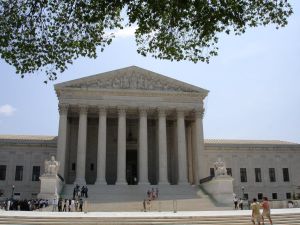Envirnomentalists Welcome Opening Arguments In Climate Case

The U.S. Supreme Court heard oral arguments in Massachusetts v. U.S. EPA, a case challenging the U.S. Environmental Protection Agency's refusal to acknowledge greenhouse gases as air pollution. While a ruling from the court on the legality of EPA's conduct is not expected until the spring, today's developments move closer to knowing whether EPA may begin reducing global warming pollution from cars and trucks without waiting for new authority from Congress, according to the National Environmental Trust.
"Today's proceedings clarified what we have known all along -- carbon dioxide is a pollutant under the Clean Air Act," says John Stanton of the National Environmental Trust. "It finally appears that the curtain is about to drop on the Bush administration's stubborn refusal to acknowledge the existence of global warming pollution.
"Given the Bush administration's failure to lead, it's time for them to step out of the way. States shouldn't have to fight Washington as they try to fight global warming," he adds.
The case began in 1999 when various environmental groups, including the National Environmental Trust, filed an administrative "rulemaking petition" requesting that EPA set motor vehicle emission standards for four greenhouse gases, including carbon dioxide. In August 2003, the EPA denied the pending rulemaking petition. At that time, EPA also stated that, as a policy matter, it would not set motor vehicle emission standards even if it had the authority. In October 2003, this decision was challenged.
On July 15, 2005 the federal appeals court for the D.C. Circuit voted 2-1 to let EPA's current position on greenhouse gas pollutants stand. In August 2005, the full bench of the appeals court for the D.C. Circuit was asked to hear the case. The court denied that request with a 4-3 decision, paving the way for the Supreme Court to review the matter. On June 26, 2006 the Supreme Court accepted the case and scheduled oral arguments for today.
The fundamental issue before the court is: Despite two previous contrary decisions by the Clinton administration, should the Bush EPA be allowed to refuse regulatory authority over global warming pollutants.
The Clean Air Act provides that EPA has authority over "any air pollutant from any class or classes of new motor vehicle ... (that) may reasonably be anticipated to endanger public health or welfare." What's more, it specifically identifies effects on "climate" as an aspect of that public welfare, according to the trust.
If you can't contribute, please support us by clicking the Google ad above. Thank you!


0 Comments:
Post a Comment
Subscribe to Post Comments [Atom]
<< Home